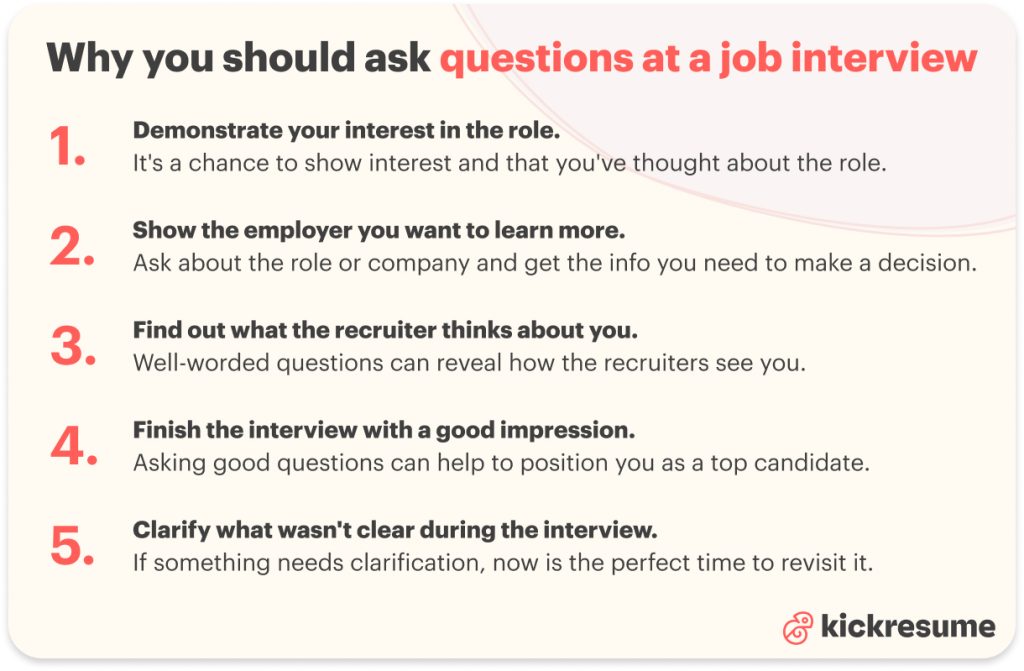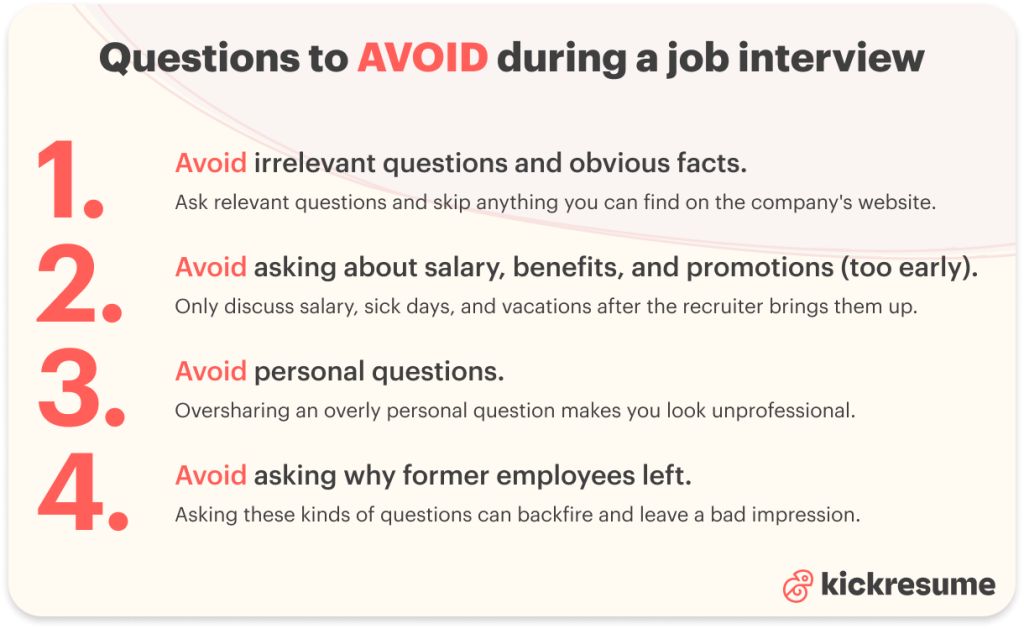As your job interview comes to an end, there’s one question you’re almost guaranteed to hear: “Do you have any questions for me?”
You might genuinely feel like you don’t know what to ask or think you already know everything important.
However, responding with “No, I’m good” is a huge missed opportunity.
Why not show your interest in the role and get valuable information about the company and position at the same time?
In this article, we’ll explain why it’s essential to ask questions during an interview, how many questions you should prepare, what types of questions to ask, and which ones can ruin it all.
Why should you always ask questions at a job interview?
Even if you're confident that the job is the right fit and you've thoroughly researched all the details, resist the urge to say that you have no questions.
Why? Well, there are good reasons for it…
You should always ask questions to:
- Demonstrate your interest in the role. It's a great chance to show you're really interested in the role and that you've taken the time to think about what it involves and if it fits your goals and the way you like to work.
- Show the employer you want to learn more. This question should benefit you too. It's a great time to confirm any details about the role or company and get the information you need to make an informed decision.
- Find out what the recruiter thinks about you. This might seem tricky, but if you word your questions right, you can learn how the recruiters see you as a candidate without crossing any lines that could hurt your chances.
- Finish the interview with a good impression. First impressions matter, but leaving a strong final impression is just as important. Demonstrating interest and asking good questions helps position you as a top candidate.
- Clarify what wasn't clear during the interview. There’s often a lot of information shared during an interview, and if something needs clarification, now is the perfect time to revisit it.

How many questions should you prepare?
When you're preparing for a job interview it's good to write down 5 to 10 questions you want to ask—either about the company or the job itself.
Don't forget to research the company so you don't ask irrelevant questions or questions that you could easily find answers to on the company website.
When you have some questions written down, don't ask them all at once.
Try to ask questions during the whole job interview (not excessively, of course) and then when the time comes and you're asked “Do you have any questions for me?” pick 2-3 questions that were left unanswered during the interview.
“Do you have any questions for me?” 25 Questions to ask
The recruiter now gives you the green light to ask anything you want, so where do you begin?
Firstly, you can revisit questions that have been brought up before and lacked explanation or weren't clear.
When everything's clear, you can start asking your own questions.
We've prepared 25 questions you can ask at a job interview when asked: “Do you have any questions for me?”
Questions about the role
- What does the onboarding process look like here?
- What are the main day-to-day tasks for this role?
- What performance goals should I aim for in the first year?
- What are the biggest challenges someone in this role might face?
- What’s one thing you’re hoping a new person can bring to the role?
Questions about the company
- What kind of learning and development opportunities do you offer?
- Are there any upcoming projects or initiatives you're excited about?
- What qualities does the leadership team admire most in their employees? And how do they recognize them?
- How does the company handle employee feedback and suggestions?
- Where does the company expect to grow in the next five years?
Questions about the company culture
- How would you describe the company culture?
- How does the company celebrate employee achievements and milestones?
- Which teams work closely with this one, and how do they collaborate?
- What qualities do successful employees in this company share?
- What’s the company’s approach to diversity and inclusion?
Questions about your qualifications
- What qualities do you look for in a candidate?
- Do you see any gaps in my qualifications that might be a concern for this position?
- What qualifications or skills are most important for success in this role?
- How do my skills and experience align with what you're looking for in this role?
- Are there any areas in my background that you feel could be improved or expanded for this position?
Questions about what the next steps are
- What are the next steps in the interview process?
- Is there anything else I can provide that would be helpful?
- When can I expect to hear back about the outcome of the interview?
- Will there be any more interviews or assessments before a final decision is made?
- How long does the overall hiring process typically take?
These questions will give you plenty of insight into the role and the company, but if you’re looking to really stand out, you might want to throw in a few more unique questions too.
And, then again, there are also questions you should definitely avoid…

Questions that can ruin it all
Want to sabotage your interview in record time? It might be easier than you think!
Asking questions is a key part of any interview. It shows you're engaged, curious, and serious about the role. But there are certain lines you definitely don’t want to cross.
The wrong question can turn off your interviewer, make you seem unprepared, or worse—unprofessional.
Or, as the youngsters say, they can also give the interviewer a serious ick.
So, what should you avoid?
- Irrelevant questions and obvious facts. Avoid questions that are irrelevant to the job or obvious facts that you can find on the company website.
- Questions about salary, benefits, and promotions (too early). Only discuss salary, sick days, and vacations after the recruiter brings them up.
- Personal questions. Don't forget it's a recruiter, not a friend. Oversharing an overly personal question makes you look problematic and unprofessional.
- Asking why former employees left. You don't need to know all the company gossip the moment you walk in the door. Asking these kinds of questions can backfire and leave a bad impression.
Here are some examples of questions that can ruin your good impression:
- What do I do in this job exactly?
- What does this company make or provide?
- Who are the main competitors of this company?
- Do you have any other jobs open right now?
- When will my first promotion be?
- When can I start taking time off?
- Will you do a background check on me or check my references?
- What are the penalties for being late or missing work?
- Can I work only remotely?
- How about we grab a coffee together?
Asking these questions will make you look unprofessional, unprepared, or like you don't know why you're even there.
After the interview
Recruiters usually ask "Do you have any questions for me" at the very end of your interview. That's why it might feel like the interview is officially over at that point.
However, your work isn’t done just yet.
There are still a few important steps you can take after the interview to help solidify your chances of getting the job.
Here’s what you should focus on after the interview:
- Send a thank you email. Write a brief email to thank the interviewer for their time and consideration, and to express your continued interest in the role.
- Send a follow-up email. Helps you stay on the recruiters' radar and emphasize your interest in the job.
- Prepare for a second round of interviews. The second round of interviews is usually a crucial step in getting hired, so being well-prepared can be essential to your success.
- Contact your references. Finally, if you used references in your resume, it might be a good time to let them know they might be contacted.
Key takeaways: "Do you have any questions for me?"
"Do you have any questions for me?" is usually the last thing you'll hear in an interview.
Saying you don’t have any questions can undo all the good work you’ve done so far.
Instead of rushing to wrap things up, take a moment to ask something thoughtful. This not only shows you're genuinely interested in the role and the company, but it also leaves a strong final impression.
So, when they ask, "Do you have any questions?" always say yes and have 2-3 ready.
For example, you can ask about:
- The job itself. You might ask about the daily responsibilities or what a typical day looks like, as well as details on the onboarding process and training.
- The company. In this case, you can learn more about company culture, the work environment, and possible development to make sure it fits your work style.
- Your qualifications. To ensure you showed your skills and experience in the best possible way.
- Next steps to do after an interview. To make sure what to expect and what actions to take.
Finally, while you're at it, don't forget to prepare for other common interview questions, such as:



